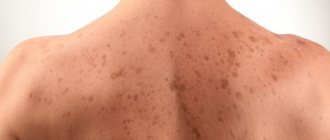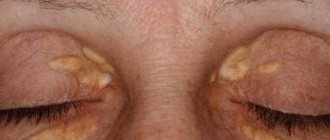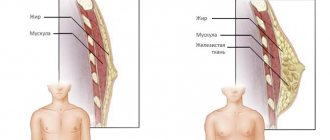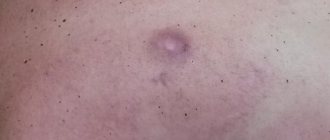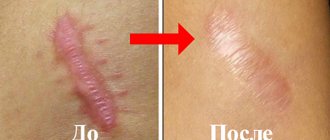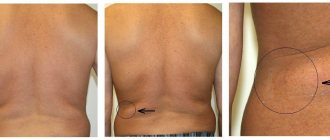Symptoms of pastiness
The word “pasty” comes from the English “dough”. It is with this that the texture of the skin of a person suffering from this disease is compared. This is due to the fact that when the face becomes pasty, the body’s water balance is disrupted. For this reason, there is a failure in the outflow of fluid through the lymphatic and venous network of the body, and the skin takes on an unattractive appearance.
Symptoms of skin pastiness are:
- swelling of the cheeks and neck;
- swelling of the eyelids;
- skin rashes;
- change in skin color;
- looseness of the skin and changes in its color;
- “jowls” - sagging cheeks;
- double chin;
- “bags” under the eyes;
- visual aging of the skin.
The places in which skin pastiness appears directly depends on the characteristics of the human body, his age and the presence of diseases.
Drug treatment
The type of drug therapy depends on the causes of swelling.
If the source of the problem is associated with allergic reactions, then the patient is prescribed:
- Loratadine – the drug reduces capillary permeability, prevents the formation of edema, and relieves itching. Prescribed 1 tablet/day, course duration is 10-15 days. Prohibited for pregnant and lactating women.
- Suprastin is an antihistamine with a quick effect. A decrease in allergy symptoms is observed after 15-30 minutes. after reception. Prescribed 1 tablet. up to 4 times a day
- Tavegil is an antiallergic drug to combat hay fever, contact dermatitis, drug allergies and insect bites. Take 1 tablet. morning and evening, in difficult cases the dosage is increased to 6 mg. Not used during pregnancy, lactation, or bronchial asthma.
Swelling on the face that occurs due to kidney dysfunction requires drug treatment. If the causes of swelling in women are associated with a malfunction in the genitourinary system, then they are prescribed diuretics.
The list of fast-acting diuretics includes:
- Veroshpiron - designed to combat mild tissue swelling. Excess fluid is removed from the body within 5 days, all necessary elements (potassium, magnesium) are preserved. Take 25-400 mg daily, the dosage depends on the diagnosis and health condition.
- Hypothiazide is a mild diuretic that blocks the absorption of sodium ions by the renal tubules. Substances that cause swelling are excreted in the urine. The medicine is prescribed for diseases of the heart and genitourinary system at a dose of 25-100 mg/day. or once every 24 hours. Additionally, magnesium and potassium preparations are prescribed.
- Diakarb - eliminates moderate and mild swelling of the face, stabilizes the water-salt balance. Symptoms disappear 2 hours after taking the medication. It has a cumulative effect, the maximum effect is observed after 1-2 days from the start of therapy. Prescribed 250 mg (1 tablet) in the morning, taken every other day. Increasing the dose does not affect the therapeutic effect.
- Spironolactone is a gentle diuretic. The medicine retains potassium in the body, while simultaneously removing sodium and accumulated fluid. Recommended for quick relief of edema in cardiac and liver pathologies, in the 2nd and 3rd trimester of pregnancy. Used at 100-200 mg/day.
- Torsemide is a medicine with antihypertensive, diuretic effects. The therapeutic effect occurs after 2-3 hours, the drug does not cause frequent urge to urinate. Treatment is carried out until swelling is eliminated, 5 mg daily.
- Furosemide is a loop diuretic. The dosage is set individually, from 20 to 80 mg/day. Self-administration, without the advice of a doctor, can lead to a lack of potassium, calcium and other microelements and the development of dehydration.
Facial bruises cause damage to soft tissues, nerves, muscles and blood vessels. At the site of injury, skin redness, hematoma, and swelling occur. Primary aid for a bruise is to apply a heating pad with ice to the affected area for 15 minutes, then apply ointments with a cooling effect:
- Boromenthol – the ointment causes constriction of blood vessels, relieves swelling, and reduces inflammation. A small amount of the drug is applied to the site of the injury 2 times a day.
- Gevkamen is a combined herbal remedy with a mild anesthetic effect. A small amount of ointment is applied to the damaged area with light massage movements. Course of treatment: 3 times a day, for 2 weeks.
- Efkamon - the medicine improves local blood circulation and relieves pain. The ointment is applied to the site of the injury 2-3 times a day. Efkamon is not used if there are skin lesions.
Prolonged use of cooling ointments can cause skin irritation and an allergic response. If symptoms appear, the patient should consult a dermatologist or allergist.
Reasons for appearance
The reasons for fluid retention in tissues may be as follows:
- Hydrostatic. It occurs as a result of increased pressure in the vessels, causing fluid to leak from them into the tissues.
- Hypoproteinemic. It appears when there is insufficient amount of protein in the blood, which makes it difficult for the fluid to “exit” beyond the capillaries.
- Membranogenic. The integrity of the membrane is compromised, and fluid flows freely into the tissue.
These disorders appear as a result of diseases or malfunctions of body systems.
If a person has a puffy face, the reasons may be as follows:
- diseases of the endocrine system;
- metabolic disease;
- inflammatory processes (rhinitis, sinusitis, conjunctivitis, frontal sinusitis);
- arterial hypertension;
- allergic reaction;
- cardiovascular diseases;
- osteochondrosis of the cervical or thoracic spine;
- disruption of the genitourinary system of the body;
- some medications (diuretics, glucocorticoids and sedatives);
- liver diseases;
- improper and unbalanced diet;
- helminthic infestation;
- hormonal disorders in women associated with premenstrual syndrome, menopause, taking certain medications, diseases of the pelvic organs or pregnancy;
- hypovitaminosis;
- hereditary skin characteristics;
- excessive consumption of alcohol and energy drinks. Doses for women in this case are significantly less than for men;
- low-quality cosmetics;
- excessive time at the computer;
- malignant neoplasms;
- diseases of the nervous system of the body;
- age over 30-35 years.
Children are more likely to experience pasty skin. Stagnation of fluid in tissues occurs due to developmental anomalies, dystrophy, anemia and diathesis.
Pasty facial skin in the morning in women occurs due to drinking large volumes of liquid the day before.
Diets with a low content of protein, vitamins and microelements in the diet also play a significant role in the appearance of a puffy face in women.
A puffy face in the morning is also a consequence of excessive smoking. Nicotine has a negative effect on peripheral blood vessels, causing spasms, reducing their strength and reducing the overall content of vitamin C in the body.
A puffy face occurs due to metabolic disorders or excessive consumption of salty, fried, spicy or fatty foods that retain fluid in the body.
Pasty skin is a phenomenon that indicates disturbances in the functioning of systems and diseases of the body. If a puffy face appears, you should immediately consult a specialist.
Age changes after 40
Natural aging of the body prevents rapid recovery from illness, surgery, and excess.
Edema in older people is associated with:
- with thrombosis of the superior vein - problems with the outflow of blood from the head cause the accumulation of excess fluid, the skin acquires a bluish tint;
- osteochondrosis of the cervical spine – the disease occurs in middle-aged and older people, accompanied by swelling of the lower eyelids, cheeks, and a feeling of fluid in the head;
Osteochondrosis of the neck can cause swelling on the face in women and men - chronic pathologies - cardiovascular, endocrine system, kidneys, gastrointestinal tract, liver.
Insufficient physical activity, sleep disturbances, frequent stress, alcohol, salty, smoked, fatty and fried foods, coffee, sweet drinks can cause morning swelling of the face after 40 years. If persistent swelling occurs, you should contact your local doctor and undergo a full diagnostic examination.
Read the popular article on the site: Menopause in women: symptoms, age-related characteristics, treatment with effective methods.
Treatment
How to get rid of facial pastiness? People experiencing this condition should first seek advice from a physician. The doctor will examine the patient and may refer him to various specialists to clarify the cause of the disease, and also take blood for analysis or recommend an ECG.
Women may be scheduled to see a gynecologist.
Pastosity is also detected using the McClure-Aldrich test. In this study, 0.2 ml of isotonic sodium chloride solution is injected under the patient's skin. The resulting blister in a healthy body resolves within an hour. When the skin is pasty, the swelling goes away much faster.
The process of treating a puffy face directly depends on the cause of the pastiness. In combination with drug therapy, the patient must follow the following specialist recommendations:
- You need to watch your diet. The patient must control diuresis so that the amount of fluid consumed is equal to the volume of urine excreted by the body. Drinking any drinks is prohibited 3 hours before bedtime. The amount of salt in the diet should not exceed 3 g per day.
- It is necessary to regulate sleep and rest patterns. Sleep should be long (at least 8 hours) and with a comfortable pillow. Every day you need to be in the fresh air and ventilate the room. Incorrect positioning of the head during sleep affects the puffiness of the facial skin.
- You should do a massage that enhances the outflow of lymph and fluid.
- You need to try to unload the lower limbs. To improve venous blood flow, it is recommended to raise your legs to an elevated position at least 15 minutes before bedtime.
- You should take vitamin complexes.
To prevent recurrence of the causes of facial puffiness, women need to use high-quality cosmetics, apply them correctly and be sure to wash them off the skin before going to bed. You should try to limit the use of decorative cosmetics as much as possible.
To get rid of pasty skin, in pharmacies you can purchase specialized forms for collecting water or ready-made masks suitable for different skin types. The latter are made from seaweed extract, mineral mud, cucumber juice, green tea extract, horse chestnut, chamomile, birch leaves and other vitamins and bioactive components.
Diuretics based on medicinal herbs (bear ears, rose hips, corn silk) also help get rid of puffy skin. Such remedies not only remove fluid from the body, but also have an antiseptic effect.
Complications
After a blow, there may be complications that only a specialist can identify. A doctor can understand the causes of eye swelling and help relieve pain. The area of the bridge of the nose and eyes is the most sensitive area; most often it is in these places that bruises and hematomas appear. An ointment, Heparin or Troxevasin, will help get rid of them; an iodine mesh and a compress with magnesium will be useful.
If a lump appears, you should watch how quickly it grows. If it does not go away for a long time, then you must consult a doctor. But none of these ways to get rid of swelling and bruising will help within 24 hours. It will take at least four days to get rid of this problem.
How to quickly remove pasty facial skin?
If the appearance of a puffy face is not associated with diseases, then ice lotions, compresses with strong tea leaves or salt will help get rid of it.
The method of contrast application is also considered effective. It consists of placing two containers with hot and cold water in front of the patient. The towel is first moistened in boiling water and applied to the face until it cools completely, and then immersed in another container and laid on the skin for 40 seconds. This alternation must be repeated 4 times.
Using traditional medicine recipes, you can get rid of pasty skin using decoctions of chamomile, plantain, birch buds and green tea.
The most common methods of dealing with puffy skin at home are masks made from raw vegetables or mashed potatoes. They need to be done several times a day until the puffiness of the facial skin gets rid of.
In cosmetology, to get rid of skin pastiness, there are physiotherapeutic procedures (lymphatic drainage, biorevitalization, microcurrent therapy, etc.) and professional masks.
Important! You should make and apply masks and compresses according to traditional medicine recipes only after consulting a doctor.
Remedies
The most suitable option for relieving swelling directly depends on its cause. The use of medicinal masks in case of hypertension will be useless; taking diuretics after lack of sleep can cause harm.
It is important to choose the safest way, in which swelling on the face does not become a consequence of a disruption in the functioning of one of the body systems.
In case of illness
Prolonged swelling, which is accompanied by other symptoms described above, is most often a consequence of the disease and requires immediate consultation with a doctor.
Any traditional methods to get rid of swelling will be useless, and the use of cosmetics that clog pores and further prevent the removal of fluid (foundation, powder) can be dangerous.
But to reduce swelling or eliminate it for a while, you can use the following means:
- diuretic (medicinal or herbal: decoction of bear ears, corn silk);
- antihistamines, but only if the cause is an allergy;
- gels that relieve swelling, but their use on the face is not recommended: most of these drugs are intended to relieve swelling from the legs, arms and other parts of the body.
Before using any of these remedies, you should consult your doctor.
With poor nutrition
If the cause is not a disease, but an unhealthy diet, then it is imperative to reduce your salt intake to 3 g per day. For greater effect, it is recommended not to use it at all for several days. In the absence of other health problems, intense exercise, a sauna or bath will help, which promote the rapid removal of salts through the skin. It is important to follow these rules:
- do not eat or drink a lot of liquids late in the evening;
- drink about 2 liters of clean water daily (we are talking about clean water, even filtered water from the tap will not work);
- reducing the amount of caffeine-containing drinks (tea, coffee);
- giving up bad habits, alcohol;
- sleep - at least 8 hours, in a comfortable bed with a low pillow;
- two-time contrast shower;
- avoiding stress.
When exposed to other factors
With short-term exposure to negative factors, swelling is also usually short-lived.
Here it is already appropriate to use folk remedies to remove it.
Overwork and lack of sleep
Signs of overwork or lack of sleep can be removed by washing with cold water or applying ice cubes to the swollen areas of the skin.
The best option is cubes of frozen decoctions of chamomile, rose petals, celandine or St. John's wort. A cold compress will also help: just wet a towel and apply it to your face for 5–10 minutes.
Postoperative condition
Swelling almost always appears as a consequence of surgery. It is most pronounced on the second or third day, after a week it decreases significantly, and after two it disappears completely. You can speed up the recovery process at home, but only with caution and under the supervision of the surgeon who performed the operation. To do this you need:
- eliminate alcohol consumption;
- reduce to a minimum the amount of salty, fatty, smoked and spicy foods in the diet;
- do not take a hot bath or go to the sauna;
- rest more, reduce the amount of physical activity, do not bend over often, which provokes an influx of fluid to the facial tissues, blink less often;
- do not spend a lot of time at the computer or reading;
- Apply cold compresses regularly and wash your face with cold water.
If swelling continues on the face for more than two weeks, you should consult a surgeon.
Blow, bruise, cut
In this case, the integrity of tissues and capillaries is disrupted, so this reaction of the body is natural. Soon the swelling becomes blue and purple in color, then turns yellow, and after 10–14 days it completely disappears.
The use of simple remedies immediately after the blow helps to significantly reduce its manifestation: apply something cold - ice, frozen food, a metal object - or medicinal (plantain leaf, cabbage leaf). Another folk remedy is bodyaga or a mixture of crushed analgin with iodine. Here it would be appropriate to use decongestant gels, which are easy to find in the pharmacy.
Alcohol consumption
After drinking alcoholic beverages in the morning, you may encounter not only swelling on your face, but also an unpleasant feeling. Usually, along with a hangover, swelling goes away. But if you urgently need to put yourself in order, then well-known express remedies will correct the situation: cold compresses, washing with ice water.
Massage
A massage to relieve facial skin pastiness is carried out exclusively with your fingertips along massage lines in the morning. You need to do it starting from the cheeks. The direction of movement is from the cheekbones to the lower jaw.
The forehead massage is carried out from the bridge of the nose towards the temples along the superciliary arches. The area around the eyes is treated carefully along the skin over the bones from the inner to the outer edge of the eye. After this, the cheekbones are massaged from the wings of the nose to the ears.
Massage has a tonic effect on the tissues and vessels of the face and increases the outflow of fluid from the tissues, which helps to get rid of skin pastiness in the shortest possible time.
https://youtu.be/kHJxLjhy4CA
What to do?
Before you think about how to get rid of puffiness, you need to understand the cause of this phenomenon. Only after this can you act purposefully, and not point your finger at the sky. If the problem lies in serious systemic diseases, treatment of puffiness is aimed at eliminating the underlying disease.
If the swelling appears against a background of complete health, it can be removed at home, without the help of specialists. There are many methods and recipes to help quickly relieve swelling. One of the simplest methods is to apply brewed and cooled tea bags.
Potatoes will also help remove puffiness under the eyes. Add a little parsley to the grated root vegetable. Experts also recommend the use of compresses and lotions made from potato juice. Chamomile will be of great benefit for puffy skin. You will feel significant relief if you apply cotton pads soaked in an infusion of flowers to the swelling.
Perhaps the easiest way to eliminate puffiness is ice. To prepare it, you can use either plain water or tea, as well as chamomile decoction. Use an ice cube to wipe the affected areas of the face.
Salon procedures will also help to cope with the problem. Masks based on hyaluronic acid, which normalizes blood flow and improves skin elasticity, are very popular. Mesotherapy using a soft roller effectively relieves swelling in the eyelid area. Recently, cosmetologists are increasingly using fillers - injections of beneficial substances under the top layer of skin. The procedure allows you to remove swelling on the cheekbones and around the nose.
Prevention of facial pastiness
In order not to encounter facial pastiness, you should follow a number of simple rules:
- give up all bad habits;
- avoid stressful situations and treat diseases of the nervous system;
- eat properly and balanced, include in your diet food containing sufficient amounts of proteins, carbohydrates, vitamins and microelements;
- you need to monitor your health and control your weight;
- undergo regular examinations by specialists;
- It is recommended at any age to use the services of a cosmetologist or do facial massage and nourishing masks at home.
The causes of pasty facial skin can be both minor and serious diseases. Therefore, it is very important to closely monitor your health and lifestyle.
The article was verified by an expert - beauty blogger @lil4olga.
Many people are concerned about swelling of the face in the morning, which can appear in girls and women, boys and men. It is accompanied by pallor, decreased skin elasticity and doughy tissue.
Without understanding the reasons, people use various advice from friends and local home remedies to eliminate swelling. However, these measures often do not have the expected effect.
Prevention and treatment of edema
To prevent edema, it is necessary to eliminate external factors of failure:
- streamline your diet, provide a sufficient amount of protein with limited fats and spices, excluding sweets, fast food, chocolate, coffee, black tea, consume more vegetables and fish;
- stop smoking and drinking alcohol;
- lead a healthy lifestyle, walk in the fresh air or engage in feasible sports (swimming, race walking);
- ensure proper sleep and rest;
- do not wear high-heeled shoes, clothing should be loose;
- Be regularly examined by a doctor, especially when taking contraceptives.
Reference . If you have swelling, you should not reduce your water intake; this will not help overcome swelling. To maintain electrolyte balance, you should drink enough water.
An alternative to synthetic estrogens can be phytoestrogens - milder agents contained in flax seeds and oil, celery, and pharmaceutical potassium preparations - products with a high potassium content (legumes, sea fish, dried apricots, strawberries, nettles).
Before using herbal remedies, consult your doctor, as some herbs may adversely affect the kidneys and aggravate stomach problems . In any case, you should not self-medicate ; you must carefully follow all medical recommendations.
In the absence of cardiac, endocrine and renal diseases, edema completely disappears within a month or two after the start of treatment. Leg diseases in women after 40 years are not inevitable, they can be avoided!
Salon treatments and massage
Among the decongestant procedures in beauty salons, they can offer lymphatic drainage - electrical stimulation to normalize the functioning of lymphatic and blood vessels and cellular metabolism, and cryolifting - a short, targeted effect of cold on the swollen area. Cells that have entered a stressed state during the procedures release excess water, and several sessions will provide a lasting effect.
A special self-massage that any woman can master will allow you to get rid of facial swelling. Massage has a multifaceted effect, namely:
- collagen synthesis is stimulated;
- lymph and blood flow is activated;
- the strength of blood vessels increases;
- Excess fluid is removed.
Contrast wash
Contrast washing works well against facial swelling. It consists of first washing your face with warm water, and then alternately changing hot water to cold water 4-5 times, finishing the procedure with cold water. Upon completion of the procedure, pat your face dry (without drying) with a soft towel. The effect of the procedure is to increase the tone of blood vessels, stimulate blood circulation and lymph flow, which eliminates fluid stagnation and swelling.
Folk recipes
Moderate swelling of the face can be easily relieved with ice cubes prepared in advance in the freezer. You can freeze herbal infusions - mint, chamomile, linden, sage, or make contrasting facial baths, alternating cold and hot water. Allergic swelling is relieved by rinsing the nose with saline solution. Diuretic infusions of birch buds, knotweed and lingonberry leaves work well against edema.
To relieve swelling of the face, you need to cut a raw potato and rub your face with the cut; even better, grate the potato and apply the paste on your face for 20 minutes, then rinse with warm water. You can make a dill-sour cream mask by mixing 1 tsp. finely chopped dill with 2 tsp. sour cream. The mask is applied to the face for 15 minutes.
You can apply a linen bag with buckwheat ground in a coffee grinder and steamed in boiling water to a face swollen from edema (dip the bag in boiling water for a couple of seconds and wait until the buckwheat cools down).
Drug treatment
An endocrinologist and gynecologist will help you get rid of hormonal edema after testing your blood and urine to determine hormone levels. Hormone levels are adjusted by appropriate medications or by taking phytoestrogens.
In case of severe swelling, limit the intake of table salt for several days. Food should be saturated with proteins to improve capillary permeability. If there is a danger to life, corticosteroids are urgently prescribed.
Reference . To remove fluid naturally, the doctor prescribes diuretics, while simultaneously prescribing potassium salts; the diet should also be saturated with foods rich in potassium. Sedatives may be prescribed to relieve the symptoms of menopause: insomnia, anxiety, nervous tension.
Vitamin complexes with sufficient contents of vitamins A, B, D, E and the mineral elements potassium, magnesium and iron can be prescribed. In some cases, swelling remains even after hormonal levels normalize, and to complete treatment you must be patient.
Having discovered that, for various external reasons, edema is increasingly beginning to appear, you need to consult a doctor, and only after clarifying the diagnosis and the doctor’s advice, resort to common methods of normalizing water metabolism - streamline your diet, master massage yourself, or go to a beauty salon for special procedures. The legs of a woman over 40 can and should look perfect!
Causes of facial swelling
General principles of edema formation
Water makes up on average 70% of body weight. The main part of it is in the cells, the rest (about 30%) is part of the intercellular (interstitial) fluid and takes part in metabolic processes, and associated with hyaluronic acid - in providing tissues with firmness, elasticity, maintaining volume and shape.
In a healthy body, the composition, distribution and volume of intercellular fluid are relatively constant. By diffusion, water enters tissues from the blood and back through the wall of capillaries and small vessels, which is a semi-permeable membrane. In addition, the outflow of excess water from tissues occurs not only through the venous system, but also through the lymphatic vessels.
A certain constant ratio of protein fractions with normal permeability of the vascular wall retains water in the bloodstream. At the same time, excess salts, mainly sodium ions, easily penetrate through the walls of small vessels into the tissue, dragging it along with it.
The rate of diffusion and fluid outflow is affected by:
- the difference between osmotic (salt) and oncotic (protein) pressures of blood and interstitial fluid;
- degree of permeability of the walls of capillaries and venules;
- hydrodynamic pressure in the bloodstream.
Any of the above reasons can lead to local edema or pastosity (barely noticeable swelling) if the outflow of fluid through the lymphatic or venous network is impaired. Regulation of water-salt metabolism is carried out by the nervous-endocrine system, and the development of edema is directly related to the retention of sodium salts in the intercellular fluid, which, in turn, retain water. These processes are influenced by the immune system, kidney, liver, lung and heart function, vascular condition, hormonal disorders in diabetes mellitus, hypothyroidism, and adrenal tumors.
The localization of edema depends on the anatomical features of a particular area of the body, its position in space (vertical, horizontal) and the type of disease. Pastiness first of all appears in the morning and on the face, especially on the eyelids. This is explained:
- prolonged horizontal or incorrect position of the body during sleep, which contributes to the redistribution of fluid to the soft tissues of the face;
- lack (at night) of activity of facial muscles for a long time, as a result of which blood flow in the venous network slows down and lymphatic drainage worsens;
- the smallest, compared to other areas, thickness of the skin and subcutaneous fat layer.
Main reasons
Thus, swelling or pastiness of the face can be caused by both general causes in the body and negative local processes:
- diseases of internal organs and disorders of the endocrine system (hypothyroidism, hypoparathyroidism, diabetes mellitus, hypothalamic-pituitary syndrome), leading to fluid retention in tissues;
- tissue characteristics due to hereditary predisposition;
- helminthic infestation (most often roundworms or pinworms), leading to a general immune reaction to toxins and antigens of parasites;
- allergic predisposition in general and in particular to dust mites, house dust, which accumulates in soft toys, bedding, etc.; an allergic reaction causes swelling of the mucous membrane of the eyes and nose, disruption of the outflow of tears through the nasolacrimal canal, difficulty in nasal breathing and the occurrence of swelling of the eyelids, pastiness (puffiness) of the entire face;
- arterial hypertension, taking antidepressants, glucocorticoids and sedatives;
- the presence of chronic inflammatory processes in the facial area - rhinitis, sinusitis and sinusitis, conjunctivitis;
- osteochondrosis of the cervical and upper thoracic spine with chronic pain syndrome leading to muscle spasm, circulatory disorders and deterioration of the outflow of blood and lymph from the head;
But edema is not always a consequence of pathological conditions. They can appear for quite common reasons:
- Facial swelling in women can be associated with the menstrual cycle, especially in the second half, with pregnancy, as well as with the use of certain oral contraceptives, with improper use of cosmetics or their poor quality.
- Age-related changes in the body after 30-35 years, accompanied by a decrease in the content of hyaluronic acid, which binds water, and an increase in free water in tissues.
- Diets for weight loss and consumption of foods low in proteins, vitamins and microelements, which leads to an increase in the permeability of the vascular wall and a decrease in oncotic pressure in the blood vessels.
- Excessive consumption, especially in the afternoon, of liquids, spices and salt in pure form and as part of food products (sausages, cheeses, smoked meats, pickles, marinades, ketchup and other seasonings, canned fish).
- Smoking - nicotine causes spasm of peripheral blood vessels, a decrease in the content of vitamin C in the body and an increase in vascular permeability.
- Frequent consumption of various energy and alcoholic drinks.
- Long-term work at the computer, sleep disturbances, psycho-emotional overload, chronic fatigue syndrome.
- Incorrect head position (low or uncomfortable) during sleep.
- Long-term use of diuretic pharmaceuticals or medicinal herbs with a diuretic effect to reduce swelling. Over time, this leads to electrolyte imbalance and the opposite reaction - compensatory fluid retention in the tissues.
If the face suffers
For women, this is a very pressing problem, and it is necessary to understand the reasons and get rid of it; appearance suffers first of all. Knowing that there is a predisposition to swelling, it is important to know how to avoid it. In what cases does fluid accumulate?
Drinks that remove water from the body (tea, coffee). They have a diuretic effect, and this is a signal to accumulate it.
Consumption of salty foods. It is salt that is able to retain liquid, which is why thirst is so common after eating salty foods.
Lack of pure water. When drinking various drinks, the body accumulates water for future use.
It all depends on how and at what time the swelling appeared. If it is a blow, it always provokes swelling in the affected area of the forehead or eyes, so depending on the severity of the injury, a number of measures must be taken to eliminate or prevent severe swelling of the eye.
After a blow, there is always a lot of blood on the forehead and in the bridge of the nose if the skin is cut. But there are cases when hematomas form, and it is not worth leaving the victim without medical care, as there may be serious consequences.
Treatment of facial swelling
Facial pastiness should not cause much concern in acute respiratory diseases, since with recovery the causes that led to it disappear. However, if it persists for a long time after a cold or occurs for no apparent reason, you should consult a general practitioner.
This is due to the fact that many diseases of internal organs (glomerulonephritis, pyelonephritis, myocarditis, diabetes mellitus, hypothyroidism, helminthic infestations, systemic autoimmune diseases, etc.) can occur in a mild or chronic form. To determine the causes of pastiness of the face and eyelids in these cases, differential diagnosis through a thorough examination is necessary.
During menopause
The occurrence of swelling during menopause is associated with impaired water-salt metabolism. The accumulation of excess sodium ions at the cellular level leads to an increase in osmotic pressure and fluid retention. Disorders occur in hot weather if a person drinks a lot of water.
Swelling on the face in women, the causes of which are a failure of sodium-potassium metabolism, may threaten the development of arterial hypertension in the future.
The occurrence of a deviation may be due to:
- with kidney pathologies;
- hypothyroidism;
- varicose veins;
- autoimmune thyroiditis.
Often the problem is combined with taking medications of certain subgroups: hormonal, antihypertensive, non-steroidal anti-inflammatory drugs. Edema is not typical for physiological menopause; it is present during the pathological course of menopause.
Possible causes of facial swelling
Below are the most common causes of facial puffiness.
Actinomycosis
Facial swelling should be assessed by a doctor
Actinomycosis is a rare and potentially dangerous chronic bacterial infection that causes swelling and abscesses in the soft tissues of the body. This condition usually affects the mouth, nose, throat, stomach and intestines.
Other symptoms of actinomycosis include the following:
When treating people with actinomycosis, doctors usually prescribe large doses of the antibiotic penicillin. If the patient is allergic to this drug, he will be offered remedies with a similar effect. Sometimes people have to undergo treatment for several months to completely get rid of the infection, but it should be understood that actinomycosis is a non-contagious, that is, non-contagious disease.
Allergic conjunctivitis
Allergic conjunctivitis is an inflammation of the eye that develops as a result of an allergic reaction. Allergens include the following:
- dust;
- mold spores;
- pet hair;
- pollen.
The main symptom of this condition is reddened and moist eyes, in which there is a burning sensation and itching. The skin around the eyes may become swollen, especially after waking up.
For any form of conjunctivitis, it is important not to rub your eyes, as doing so can make symptoms worse.
People can prevent allergic conjunctivitis by avoiding allergens. Treatment for this condition involves applying cold compresses to the inflamed areas and taking medications such as antihistamines and anti-inflammatory or steroid eye drops.
Anaphylactic shock
Anaphylactic shock is an acute allergic reaction. This is a medical condition that can be fatal and therefore requires immediate medical attention. Symptoms tend to appear soon after the body interacts with allergens, and their severity quickly worsens. Symptoms of anaphylactic shock include the following:
- labored breathing;
- diarrhea;
- swelling of the face;
- urticaria (red, raised, itchy rash);
- itching;
- loss of consciousness;
- nausea and vomiting;
- cardiopalmus;
- sudden drop in blood pressure.
If a person experiences symptoms of anaphylactic shock, they should seek emergency medical attention immediately.
Angioedema
Angioedema is swelling that occurs as a result of an allergic reaction to food, medications, or other allergens such as insect bites. In addition to facial swelling, symptoms of angioedema include the following:
Mild angioedema does not always require treatment, although in such cases exposure to allergens should be avoided. For moderate to severe symptoms, the use of epinephrine, antihistamines, or other medications may be necessary.
Home care methods include using cold compresses and wearing loose clothing.
Nose fracture
Various traumatic episodes can cause a nasal fracture. Such damage can also lead to facial swelling and other symptoms, such as:
- crooked nose;
- bruising;
- nosebleeds;
- pain.
A nasal fracture does not always require medical attention, but people should see a doctor after any facial injuries. Treatment usually involves taking painkillers, splinting, and applying cold compresses. Some patients in such situations require surgery.
Cellulite
Antibiotics help treat cellulite
Cellulite is a bacterial skin infection that causes redness, swelling and local fever in the affected areas. Cellulite can also cause pain. Without treatment, this condition can be life-threatening.
Signs of an acute infection include the following:
- fever;
- chills;
- red streaks extending from the rash.
To treat cellulite, doctors usually prescribe antibiotics, which patients take for at least five days. Painkillers and complete rest for the body also help reduce discomfort.
Swelling of the left side of the face causes
If a person wakes up with a puffy face after a heavy meal, then this is unpleasant, but the reason for this phenomenon is clear. But what to do if swelling appears on the right or left side of the face, and this is caused by completely unclear reasons that are difficult to understand.
The cause of swelling on one side of the face may be:
- incorrect body position during sleep. Swelling appears in the morning and this is due to the fact that a person either sleeps on one side or tilts his head in a certain direction during sleep. For example, you sleep on a bolster pillow, but your head is still tilted back. Also, the cause of swelling on one side of the face may be a violation of the outflow of fluid due to pressure on blood vessels;
- Drink plenty of fluids during the day and especially at night. Therefore, you should try not to drink a lot of liquid one hour before bedtime;
- ENT diseases. In this case, the right or left side of the face may swell, for example, with sinusitis;
- pinching of the facial nerve. This causes swelling on one side - the right or the left. Also, the cause of edema may be trigeminal neuralgia;
- problems with teeth. Inflammation of the gums, toothache, caries can also be causes of swelling on the side of the face where the diseased tooth is located;
- inflammation of the eye. The eye will begin to become very watery and swollen, swelling will spread down the cheek, and vision may even deteriorate. Here you definitely need to go to an ophthalmologist.
— buy an orthopedic pillow. With the correct position of the head during sleep, there will be a normal outflow of fluid, and swelling on the face will not appear;
- reduce salt intake in food;
- give up alcohol. This also applies to smoked foods, carbonated drinks, and coffee, which delay the outflow of fluid and cause swelling of the face;
- try to sleep more. If your sleep is disturbed, consult a doctor and do not overload yourself with work, it is better to take a walk in the fresh air.
www.otekstop.ru
Sleeping on your left side
The most common and at the same time harmless reason is your love of sleeping exclusively (or mostly) on your left side. Then the fluid accumulates in the tissues on the left side, on the left half of the face. Some advice would be to change your sleeping position more often or better sleep on your back so as not to see swelling on your face in the morning.
Heart
Swelling under the left eye can also be caused by heart problems. You shouldn’t worry or panic right away, as this is only the first sign, which means you can undergo early diagnosis and begin timely measures. It is worth making an appointment with a cardiologist for an examination.
Internal organs
Swelling on one side of the face may also be associated with problems in other internal organs. You have already read about hernias and pinching. In addition, there is swelling of one eyelid due to problems with the intestines and stomach.
Cold
If during a cold it swells under the left eye, then this can be caused by left-sided sinusitis or sinusitis. It is imperative to treat this disease first, and not with folk lotions and decoctions for the eyelid area.
Allergies to bites, cosmetics
If you have allergic swelling of the left eye, the reasons for its appearance:
- insect bites, which is especially important in the summer,
- cosmetics, etc.
That is, all the same factors as with right-sided edema. The accompanying symptoms will help you understand that this is an allergic reaction:
- itching and burning,
- pain,
- pallor or bluishness of the skin of the eyelid.
Sometimes the swelling of the eye on the left can spread lower - down to the cheeks or corners of the mouth. In case of allergies, swelling occurs immediately and after 12 hours (or several days) disappears completely. General health may deteriorate.
For severe swelling and angioedema, which we have already written about, the help of a doctor is required . Sometimes you may simply be bothered by severe swelling with pinpoint infiltrates on the cornea of your left eye.
Be sure to consult a doctor, because the consequences of neglect can be:
- chemosis of the conjunctiva, that is, the risk of secondary glaucoma,
- exophthalmos,
- outward displacement of the eyeball.
Dental diseases
If you have swelling under your left eye, you should look for reasons at the dentist's office. Especially when:
- there is pain in the tooth area on the left side of the jaw,
- the gums swell on this side,
- sore or suppuration in the mouth on this side,
- there is pain when you press on the gum or tooth on the left.
All this is true for the right eye and the right side of the jaw, but the site podglazami.ru deliberately did not describe this in the previous article, so as not to repeat itself.
These symptoms indicate an acute inflammatory process in the oral cavity. Visit your dentist immediately.
Eye problems
Sometimes, to find an answer to the question of why only the left eye is swollen, it is worth contacting an ophthalmologist.
To prevent you from diagnosing yourself, we will not describe in detail the symptoms of all possible eye problems. Here is just a list of possible reasons:
- staphylococcal barley,
- left eyelid hernia
- blepharitis,
- abscess,
- keratitis,
- ciliary demodicosis,
- blepharitis.
The same pathologies can also occur in the right eye, and then swelling of this side of the face will be a concern.
The search for causes and measures in accordance with them is the main thing in this case. You should not use various folk remedies or medications thoughtlessly. It can cause harm. And there are many reasons: from harmless to serious. Several articles on the website are devoted to them and measures to combat them. We recommend that you be more attentive to your health and, instead of online consultations, seek in-person consultations.
www.podglazami.ru
Causes of facial swelling
Even the healthiest person can experience facial swelling.
The reasons for its appearance may be the following:
- malnutrition;
- following an incorrect diet;
- lack of sleep;
- chronic fatigue.
But it should be remembered that swelling of the face can also signal a serious disorder in the body. So, in particular, the causes of facial swelling may indicate a disruption in the functioning of internal organs - kidneys, liver, thyroid gland, heart or blood vessels. The symptoms are similar to Quincke's edema.
In addition, swelling of the face is often provoked by a lack of certain vitamins in the body.
In general, the causes of facial swelling are multiple and varied. In addition to the above, swelling can be caused by alcohol consumption, exposure to high temperatures, sinusitis, allergic reactions and a host of other factors.
What diseases do facial swelling warn of?
Doctors say that if swelling begins to appear in the late afternoon, a person should visit a cardiologist - such swelling is strong evidence of heart problems.
Such cardiac edema is always accompanied by an enlarged liver. In addition, with such a pathology, it is difficult for the patient to lie in a horizontal position due to shortness of breath. To the touch, cardiac edema is very dense.
Morning swelling, especially around the eyes, can appear for various reasons:
- overwork and lack of sleep;
- drinking alcohol;
- kidney diseases.
If the kidneys are sick, the face and eyelids swell first. The swelling is watery, soft, and easily moving. Along with eye swelling, peripheral edema and increased blood pressure may occur. Chronic renal failure is accompanied by a bronze-lemon skin tone.
Patients with chronic kidney diseases usually begin to rapidly gain weight before swelling - this occurs due to the appearance of internal edema, hidden from view.
What can cause facial swelling?
An allergic reaction can cause angioedema of the face. The reasons that provoke such swelling are all kinds of allergens that come into contact with a person (foods, medications, insect poison and others).
Allergic swelling of the face, as a rule, is accompanied by additional symptoms, in particular, the following may appear:
- rash and itching;
- difficulty breathing;
- in severe cases - loss of consciousness.
If the swelling is accompanied by cyanosis, then it is likely that the cause of the pathology is vascular in nature. In this case, the likely cause of facial swelling is thrombosis of the superior vena cava.
Infections localized in carious teeth, paranasal sinuses and tonsils can lead to worsened outflow and stagnation of lymph in the lymph nodes of the lower jaw. This leads to unilateral or bilateral swelling of the face, which disappears along with the subsidence of the inflammatory process.
Less common causes of facial swelling are scleroderma, dermatomyositis, and cavernous sinus thrombosis, which is usually observed after inflammation of the paranasal sinuses or other parts of the face. This disease is typical for people with diabetes and reduced immunity.
How to treat facial swelling?
Facial swelling is typical for people with endocrine diseases. So, in particular, patients with Cushing's syndrome have a swollen, moon-shaped face.
Myxedema is another endocrine disease that leads to severe swelling of the facial skin and subcutaneous tissue. This severe form of hypothyroidism, caused by a lack of thyroid hormones, is treated with hormone therapy.
After hormonal balance is restored, lymph outflow normalizes and swelling goes away.
Regular swelling cannot be ignored. Treatment of facial swelling begins with a visit to a therapist - he will refer the patient for the necessary tests and consultation with specialists.
If the cause of facial swelling is renal or heart failure, the patient must undergo an appropriate course of treatment.
When the functioning of the diseased organs is normalized, the swelling will disappear on its own.
If the cause of swelling is an allergic reaction, the first priority is to identify the substance that acted as the provoking allergen. The patient is prescribed a course of antihistamines.
General recommendations for facial swelling
For regular swelling of the face, it is advised:
- drink clean, or even better, melt water - at least eight glasses daily;
- if you cannot drink that much water, replace it with herbal tea, but be sure to replace sugar with honey;
- drink diuretic herbs that are good for relieving swelling: bear's ear, corn silk and others;
- drink bay leaf infusion - brew 3-4 leaves in a glass of boiling water, drink a tablespoon throughout the day;
- sleep for at least eight hours, and the pillow should be firm and low;
- You can't eat at night.
Some popular advice
- By applying a mask of grated raw potatoes to the face, the swelling can be removed in a quarter of an hour.
- A mask made from grated parsley roots helps relieve swelling of the face and eyes.
- People prone to swelling should have on hand ice cubes made from a decoction of chamomile, celandine and rose petals.
- It is recommended to drink a cup of green tea, and also apply a napkin soaked in strongly brewed green tea to your face.
- You can use a pumpkin mask made from two tablespoons of grated pumpkin and a small amount of water. After bringing the mixture over low heat until smooth, add a spoonful of honey. Apply the cooled mixture to your skin. After 10 minutes, rinse it off with warm water.
Source: https://uhodzalitsom.online/vokrug-glaz/otek-levoj-storony-litsa-prichiny.html
When should you see a doctor?
You should see your doctor if facial swelling does not go away after a few days, or if the problem is accompanied by other symptoms, such as pain, redness or itching.
Emergency medical care should be called if a person experiences symptoms of anaphylactic shock, or if they have been exposed to dangerous allergens or have been bitten by a poisonous insect.
Urgent medical attention should be sought if symptoms of superior vena cava syndrome develop. Those people who have been diagnosed with cancer, as well as their relatives, should be well aware of these symptoms.
The most important
Eye swelling in the morning may be normal. They appear after an alcoholic party, as well as after drinking large amounts of water, pickles, and smoked foods. Swelling occurs when using new cosmetics, during pregnancy, during menstruation, and also after strong crying. Serious causes may be hidden behind puffiness, among which are heart and kidney pathologies, allergic reactions, and diseases of the ENT organs. If the swelling is permanent and does not go away for a long time, you need to consult a doctor and conduct a comprehensive examination.
Prevention
Not all causes of facial swelling can be prevented, but the following recommendations may help:
- avoid known allergens, including problematic foods and medications;
- Maintain good oral hygiene by brushing and flossing regularly to avoid tooth and gum infections;
- Eat a healthy diet and reduce stress to stimulate the immune system, which protects the body from infections that cause swelling.
How to deal with swelling
The choice of an effective decongestant depends on the cause of the swelling. Both pharmaceutical preparations and traditional medicine recipes are used, and various physiotherapy procedures will be a good addition. But you shouldn’t try all the suggested remedies on yourself at once. The desired effect is achieved only with consistent, coordinated actions. The basic rules of treatment are as follows:
- For pathologies of the kidneys, liver, and blood vessels, undergo the necessary examination and begin comprehensive treatment of the underlying disease. As the functions of the internal organs are restored, the swelling will also go away. Diet therapy and physical activity that stimulates the outflow of blood and lymph will be a good help.
- Diseases of the endocrine system require more complex and lengthy treatment. Restoring hormonal levels is not so easy, especially in older people. Various herbal remedies will help here, which can be used for a long time without significant side effects. In diabetes mellitus, following a diet is extremely important.
- Treatment of allergic edema, as mentioned above, is based primarily on identifying the irritant allergen. Any antihistamines alleviate the patient's condition only temporarily, but do not provide a lasting therapeutic effect. Therefore, a patient prone to allergic reactions should always have with him a sheet with a list of hazardous substances, and it is also necessary to make a corresponding entry in the medical record.
- Pain and swelling due to eye inflammation or upper respiratory tract infections are also eliminated through complex treatment. Antibacterial and anti-inflammatory drugs of systemic action and agents for local use are used: various solutions and liquids for washing, rinsing, compresses and lotions.
Pharmacies offer a wide range of different diuretics. Some of them have a rather aggressive effect on the body and have a long list of contraindications and side effects. Therefore, you can resort to medication to solve the problem only after examination by a doctor.
For severe swelling, your doctor may prescribe one of the following medications:
- Furosemide.
- Triflas.
- Veroshpiron.
- Torsemide.
Pharmaceutical drugs with a diuretic effect are enough to be taken once a day to reduce the volume of fluid in the body, but they also have a number of serious side effects
What tests are needed for facial swelling?
Diagnosis depends on symptoms and physical examination findings. The examination may include the following tests:
- Laboratory tests: serological tests, kidney function tests, thyroid hormones;
- Microbiological tests: culture of purulent contents, analysis for mycobacteria;
- Instrumental tests: ultrasound of the salivary glands, computed tomography, magnetic resonance imaging of the paranasal sinuses and central nervous system, dental radiography, pantomogram.
Diseases occurring with inflammatory swelling of the face
- Inflammation, a deep infection of the skin and subcutaneous tissue, developing as a complication of inflammation of the hair follicle, sweat or sebaceous gland. Intramuscular or intravenous antibiotic therapy is required around the apex or vestibule of the nose and upper lip because, due to the anatomical connections of the vessels in this area with the vessels of the brain, inflammation can cause a life-threatening complication.
- Complications of rhinitis and paranasal sinuses.
- Inflammation of the orbit, eyelids and lacrimal system.
- Mumps.
- Erysipelas: streptococcal inflammation of the skin and connective tissue of the lymphatic system.
- Inflammation of the soft tissues of the sublingual and submandibular area, most often developing as a result of periodontal changes.
Inflammation of the eyelids
Mumps



